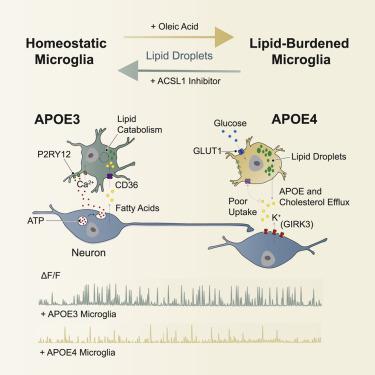Cell Stem Cell ( IF 19.8 ) Pub Date : 2022-08-04 , DOI: 10.1016/j.stem.2022.07.005 Matheus B Victor 1 , Noelle Leary 1 , Xochitl Luna 1 , Hiruy S Meharena 1 , Aine Ni Scannail 1 , P Lorenzo Bozzelli 1 , George Samaan 1 , Mitchell H Murdock 1 , Djuna von Maydell 1 , Audrey H Effenberger 1 , Oyku Cerit 1 , Hsin-Lan Wen 1 , Liwang Liu 1 , Gwyneth Welch 1 , Maeve Bonner 1 , Li-Huei Tsai 2

|
Apolipoprotein E4 (APOE4) is the greatest known genetic risk factor for developing sporadic Alzheimer’s disease. How the interaction of APOE4 microglia with neurons differs from microglia expressing the disease-neutral APOE3 allele remains unknown. Here, we employ CRISPR-edited induced pluripotent stem cells (iPSCs) to dissect the impact of APOE4 in neuron-microglia communication. Our results reveal that APOE4 induces a lipid-accumulated state that renders microglia weakly responsive to neuronal activity. By examining the transcriptional signatures of APOE3 versus APOE4 microglia in response to neuronal conditioned media, we established that neuronal cues differentially induce a lipogenic program in APOE4 microglia that exacerbates pro-inflammatory signals. Through decreased uptake of extracellular fatty acids and lipoproteins, we identified that APOE4 microglia disrupts the coordinated activity of neuronal ensembles. These findings suggest that abnormal neuronal network-level disturbances observed in Alzheimer’s disease patients harboring APOE4 may in part be triggered by impairment in lipid homeostasis in non-neuronal cells.
中文翻译:

APOE4 诱导的脂质积累损害小胶质细胞对神经元网络活动的监视
载脂蛋白 E4 (APOE4) 是已知的导致散发性阿尔茨海默病的最大遗传风险因素。APOE4 小胶质细胞与神经元的相互作用与表达疾病中性 APOE3 等位基因的小胶质细胞有何不同仍不清楚。在这里,我们利用 CRISPR 编辑的诱导多能干细胞 (iPSC) 来剖析 APOE4 在神经元-小胶质细胞通讯中的影响。我们的结果表明 APOE4 诱导脂质积累状态,使小胶质细胞对神经元活动反应较弱。通过检查 APOE3 与 APOE4 小胶质细胞对神经元条件培养基的反应的转录特征,我们确定神经元信号差异性地诱导 APOE4 小胶质细胞中的脂肪生成程序,从而加剧促炎信号。通过减少细胞外脂肪酸和脂蛋白的摄取,我们发现 APOE4 小胶质细胞破坏了神经元群的协调活动。这些发现表明,在携带 APOE4 的阿尔茨海默病患者中观察到的异常神经元网络水平紊乱可能部分是由非神经元细胞脂质稳态受损引发的。











































 京公网安备 11010802027423号
京公网安备 11010802027423号